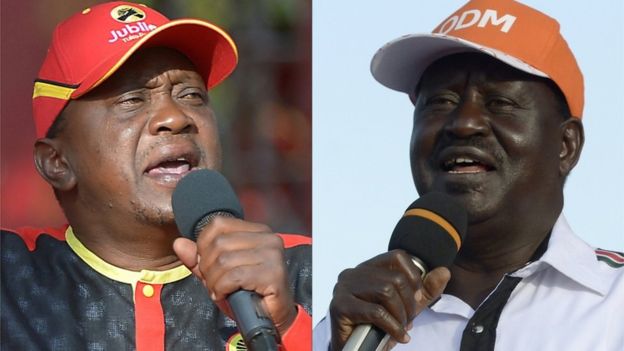It was a battle between arch rivals from two political dynasties – Uhuru Kenyatta, son of Kenya’s first president, and Raila Odinga, son of the first vice president. Kenyatta and his Jubilee Alliance emerged as clear winners.
For former Prime Minster Odinga, who ran with his newly formed National Super Alliance (NASA), this is a heavy blow. It was his fourth shot at the presidency and probably his last as he is now 72 years old.
History now seems to be repeating itself and there is a real sense of déjà vu. In both previous elections, Odinga refused to accept the results. He went to court – and lost. Fearing outbreaks of violence, many Kenyans have already left the country’s major urban centers.
Odinga is now playing with fire. During the campaign period, he announced that, in the event of defeat, he would not recognize the result. Now he is ratcheting up his rhetoric, talking of a scandal and vote rigging as a result of hacker attacks. He claims that the opposition’s secretly-located election center has obtained proof that he is in fact the winner.
Such claims could unleash violence between the country’s different ethnic groups and opposition supporters. The police must act responsibly and appropriately when dealing with demonstrations. Security forces in Kenya do not enjoy a good reputation.
They are often accused of using indiscriminate force and brutality and of committing extra-judicial killings. On Tuesday night, after polling stations closed, several people died in clashes in various parts of the country.
Civil society groups, churches and the media had all called for calm in the run up to the elections. Kenyans are still traumatized by the appaling outburst of violence after the 2007 election. More than 1,000 people died then and hundreds of thousands were displaced. That must never happen again!
However, there is worldwide concern that such a scenario could be repeated. Barack Obama, whose father came from Kenya, addressed Kenyans directly, calling on them not to allow themselves to be provoked. UN Secretary General Antonio Guterres also called for peaceful elections.
Odinga, who likes to present himself as a democratic statesman, should act as such and stop inciting his supporters. He should choose the legal route and have a court examine the validity of the elections results.
From a geopolitical perspective, it is also important that Kenya remains peaceful. The country functions as a bulwark against Islamist terror group al-Shabab in Somalia. Countries in central Africa such as Uganda, South Sudan, Rwanda and Burundi, depend on Kenya for the transport of essential commodities. There is real truth in the saying: “When Kenya sneezes, the region catches cold.”
What about Kenyatta? There is now plenty to do for the multi-millionaire. He must create jobs, above all for young Kenyans who make up the majority of the population. He must ensure that more people profit from Kenya’s economic boom. He must keep food prices stable and fight against corruption.
Whether he will indeed make a serious effort to meet these challenges is questionable, since he has already had one term in office to do so. One can only hope that Kenya’s dynamic civil society will change its traditionally ethnic-oriented voting behavior and that a new, young political class will have the chance to grow and develop. Kenya needs politicians who really mean what they promise and who implement their campaign pledges for the good of the whole country.




